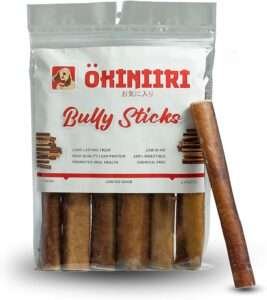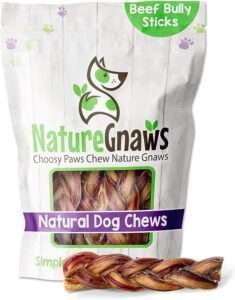Last Update 23 jan 2024
Longest Lasting Bully Sticks For Dogs
Are you looking for the best bully sticks for dogs? Here, we delve in-depth into bully sticks, their benefits, top picks, and more. In other words, it’s a comprehensive guide for dog owners.
The Best Bully Stick for Dogs
All About Bully Sticks: An Essential Guide for Dog Owners
Before selecting the best bully sticks for your dogs, it’s important to understand what they are, their benefits, and why they are an excellent choice for your pet. In this guide, we delve into the details of bully sticks, covering everything from their composition to the numerous advantages they offer. By understanding these aspects, you can make an informed decision about why bully sticks are not just a treat, but a beneficial addition to your dog’s routine. Let’s explore this topic further to help you choose the most suitable bully sticks for your furry friend.

What Are Bully Sticks?
In the realm of dog chews, bully sticks stand out as a natural and nutritious option. Crafted from dried beef muscle, these high-protein treats are a hit among dog owners. They are not just a source of entertainment for dogs but also contribute to their dental health by cleaning teeth and reducing tartar. Nutrient-rich and durable, these chews hold up well over time. What sets bully sticks apart is their digestibility, making them a safer alternative to many other chews and catering to the chewing instincts of dogs in a healthy way.
The History of Bully Sticks in Dog Care
Bully sticks have a fascinating journey in the world of dog care, tracing back several years. Initially emerging as an overlooked by-product of the beef industry, these chews gradually gained recognition for their numerous benefits. Over time, they have become a favored choice among pet owners who prioritize natural, safe, and healthy options for their pets. This shift from an underutilized resource to a staple in dog treats highlights the evolving understanding and appreciation of natural dog chews. The growing popularity of bully sticks reflects a broader trend towards healthier, more sustainable choices in pet care, demonstrating a significant change in how pet owners approach their dogs’ dietary and entertainment needs.


Why Choose Bully Sticks for Your Dog?
Selecting bully sticks as a treat for your dog comes with a host of benefits. These chews are not only a source of high-quality protein but also support dental health by aiding in the reduction of plaque and tartar buildup. Their digestibility sets them apart from other chews like rawhide, making them a safer and healthier option. Bully sticks are also beneficial for dogs who love to chew, providing a satisfying and durable chew that lasts longer. This combination of nutrition, dental care, and long-lasting enjoyment makes bully sticks an ideal choice for pet owners seeking a wholesome and engaging treat for their furry companions.
Top 07 Bully Sticks for Dogs: In-Depth Reviews and Comparisons

1. Best Bully Sticks 4 Inch
Common Queries About Best Bully Stick 4 Inch

2.Nature Gnaws Braided Bully Sticks
Common Queries About Nature Gnaws Braided Bully Sticks
Photo Gallery




3. OKINIIRI Bully Sticks for Dogs
Common Queries About OKINIIRI Bully Sticks for Dogs
Photo Gallery




4.Dental Chews – Downtown Pet Supply 6 Inch Bully Sticks For Large Dogs
Common Queries About Dental Chews – Downtown Pet Supply 6 Inch Bully Sticks For Large Dogs
Photo Gallery




5.Natural Farm Odor-free Bully Sticks
Common Queries About Natural Farm Odor-free Bully Sticks
Photo Gallery




6.Barkworthies Odor-free 6-inch
Common Queries About Barkworthies Odor-free 6-inch
Photo Gallery




7. Jack&Pup 6 Inch Bully Sticks
Common Queries About Best Bully Stick 4 Inch
Photo Gallery



Health and Nutrition: Understanding the Impact of Bully Sticks on Your Dog's Well-being

Nutritional Benefits of Bully Sticks: More Than Just a Treat
Bully Stick Ingredients: A Closer Look
- 100% Natural Beef: Bully sticks are made from a single ingredient – the beef muscle, known as pizzle.
- High Protein Content: Essential for muscle development, bully sticks are packed with proteins, crucial for your dog’s growth and energy.
Benefits for Dogs of All Ages
- Puppies: Ideal for teething puppies, providing a safe chewing outlet.
- Adult Dogs: Great for maintaining muscle mass and overall health.
- Senior Dogs: Helpful in preserving muscle strength and preventing atrophy.
Dental Health Advantages
- Natural Dental Cleaning: Chewing bully sticks helps in reducing plaque and tartar buildup, promoting better dental health.
- Breath Freshening: Regular chewing can also help in keeping your dog’s breath fresher.
Nutritional Elements
- Rich in Amino Acids: Taurine, for heart health, and collagen, for joints and skin.
- Low in Fat: A healthier option compared to many processed treats.
Weight Management
- Calorie Considerations: Bully sticks are calorie-dense, so portion control is important.
- Ideal for Active Dogs: Provides sustained energy for active and athletic dogs.
Digestive Health
- Highly Digestible: Safer for dogs’ stomachs compared to other chews.
- No Artificial Additives: Reduces the risk of digestive disturbances.
Allergen-Friendly
- Single Ingredient: Minimizes the risk of allergic reactions.
- No Grains or Gluten: Suitable for dogs with grain sensitivities.
Longevity and Mental Health
- Long-Lasting Chew: Provides mental stimulation and helps reduce anxiety.
- Satisfying Texture: Engages dogs for longer periods, preventing boredom.
Versatility in Diet
- Complementary Treat: Can be incorporated into various diets, including raw and kibble-based.
- Hydration Note: Always provide fresh water to aid in digestion.
Assessing the Safety of Bully Sticks for Different Dogs
Bully sticks are often touted as a safer alternative to traditional bones or rawhide chews. The key reasons lie in their natural composition and processing. Unlike bones or rawhides, bully sticks have a minimal risk of splintering, significantly reducing the chances of choking or intestinal blockages. This feature makes them a preferable option, especially for unsupervised chewing sessions.
However, the suitability of bully sticks does vary among dogs. For instance, puppies with developing teeth may find these chews too hard, potentially leading to dental issues. Similarly, dogs with sensitive stomachs or specific health concerns might experience adverse reactions to bully sticks. The rich, natural flavor and high protein content, while beneficial for many, can be overwhelming for some.
The best course of action is to consult with a veterinarian before introducing bully sticks into your dog’s diet. This is particularly important for dogs with known dietary sensitivities or health conditions. Your vet can provide tailored advice based on your dog’s specific health needs and dietary history.


Smart Feeding: Balancing Bully Sticks in Your Dog's Diet
Incorporating bully sticks into your dog’s diet needs thoughtful planning. These treats, while nutritious, are also rich in calories. To avoid the risk of overfeeding and potential obesity, it’s important to adjust your dog’s regular meals to compensate for the extra calories from the bully sticks. A balanced approach is key to maintaining your dog’s ideal weight and overall health.
Hydration is another critical factor to consider when offering bully sticks. The act of chewing can increase your dog’s need for water. Ensuring that there is always fresh water available during and after chewing sessions aids in proper digestion and helps prevent any potential choking hazards. This practice not only enhances the safety of enjoying bully sticks but also supports your dog’s overall hydration needs.
Moreover, monitoring your dog’s reaction to bully sticks is crucial. Every dog reacts differently to dietary changes, and some may require a more gradual introduction to these chews. Observing your dog’s digestive response to bully sticks can help in determining the right frequency and quantity suitable for their diet.
In essence, integrating bully sticks into your dog’s diet should be a balanced and monitored process. Paying attention to calorie intake, ensuring adequate hydration, and observing your dog’s individual reaction are key steps in making bully sticks a healthy and enjoyable part of their routine.
Usage and Storage of Bully Sticks: Ensuring Safety and Freshness

How to Properly Feed Bully Sticks to Your Dog
Feeding bully sticks to your dog involves more than just handing them the treat. Start by selecting a stick appropriate for your dog’s size and chewing habits. Large dogs may need thicker, longer sticks, while smaller breeds can manage with thinner, shorter ones. Always supervise your dog during chew sessions to prevent choking hazards, especially when the stick gets small enough to swallow. Limiting chew time to prevent overexertion and ensuring your dog doesn’t consume too much at once is also crucial for their health.
Storing Bully Sticks: Best Practices
Proper storage of bully sticks is essential to maintain their freshness and prevent contamination. Keep them in a cool, dry place, away from direct sunlight and moisture. If you buy in bulk, consider storing them in an airtight container or resealable bag to retain their quality and prevent any unwanted odors from spreading. Avoid storing bully sticks in humid areas, as moisture can lead to mold growth and reduce their shelf life.


Signs Your Dog Might Be Allergic to Bully Sticks
While allergies to bully sticks are rare, they can occur. Watch for signs like excessive itching, redness of the skin, gastrointestinal upset, or ear infections after giving your dog a bully stick. If you notice any of these symptoms, discontinue use and consult your veterinarian. They can help determine if it’s an allergy to bully sticks or another underlying issue and advise on the best course of action.
Comparison Guides: Evaluating Bully Sticks in the World of Dog Chews

Bully Sticks vs. Other Dog Chews: A Comparative Analysis
When comparing bully sticks to other dog chews, several factors come into play. Bully sticks are known for their natural composition, being made from 100% beef muscle. This differs significantly from other chews like rawhide or synthetic options, which may contain artificial ingredients or preservatives.
Safety: Bully sticks are generally safer than rawhide chews, which can pose choking hazards or cause intestinal blockages. They are less prone to splintering, a common issue with bones or hard plastic chews.
Digestibility: Bully sticks are more digestible compared to rawhide or synthetic chews. This reduces the risk of gastrointestinal blockages, a concern with less digestible options.
Nutritional Value: Bully sticks are high in protein and low in fat, making them a healthier choice over many other chews, especially those with artificial additives.
Longevity: While some synthetic chews might last longer, bully sticks offer a balance between durability and safety, providing a satisfactory chew time without the risks associated with harder materials.
Price vs. Quality in Bully Sticks: Finding the Best Value
In the market of bully sticks, price and quality can vary greatly. Cheaper options might be tempting, but they often compromise on the quality of ingredients or processing methods. Higher-priced bully sticks usually indicate better quality, such as being made from grass-fed, free-range beef, and having no artificial preservatives.
Source and Quality of Ingredients: Premium bully sticks are often sourced from better-quality beef, ensuring a safer and more nutritious chew for your dog. The ethical sourcing of the beef can also play a role in the price.
Processing Methods: Less expensive bully sticks might be treated with chemicals or preservatives, while higher-quality options usually undergo safer, more natural processing methods, which can reflect in the cost.
Long-Term Health Impact: Investing in higher-quality bully sticks can contribute to your dog’s long-term health, potentially saving costs on veterinary bills related to poor-quality chews.
Balancing Cost and Quality: Finding the best value involves balancing cost with these quality factors. While the cheapest option might not be the best, the most expensive one might not always be necessary. Look for a bully stick that offers a balance of safety, nutritional value, and ethical sourcing.
Customer Perspectives: Real Experiences with Bully Sticks

Testimonials and Stories from Dog Owners
Hearing from fellow dog owners about their experiences with bully sticks can be incredibly insightful. In this section, we feature a collection of testimonials from our community. These stories range from how bully sticks have positively impacted their dogs’ dental health to how they’ve become a favorite treat for their pets. For example, one dog owner shares how their once anxious dog found comfort and stress relief in chewing bully sticks, while another highlights the convenience and peace of mind provided by the natural, safe composition of these chews. These personal accounts not only offer real-world insights but also build a sense of community and trust among dog owners.
Photo Gallery: Dogs Enjoying Their Bully Sticks
There’s nothing more convincing than seeing happy dogs enjoying their treats. Our photo gallery showcases various breeds and sizes of dogs blissfully chewing on bully sticks. This visual display not only celebrates the joy and satisfaction these chews bring to dogs but also gives new visitors a glimpse of the product in action. The gallery includes candid shots of dogs in different settings – from cozy indoor nooks to outdoor adventures – all united by their enjoyment of bully sticks.




Ask the Community: Interactive Q&A Session on Bully Sticks
Engagement with the community is key to understanding and addressing the diverse needs and questions of dog owners. In our interactive Q&A session, we invite visitors to ask any questions they might have about bully sticks. This could range from inquiries about the best size and type of bully stick for their dog, to questions about safety and nutritional aspects. Experienced dog owners and our team of experts will be available to provide answers, fostering an interactive and supportive online community.
Sustainability and Sourcing: Understanding the Origin of Bully Sticks

How Bully Sticks Are Made: A Behind-the-Scenes Look
The process of making bully sticks is fascinating and speaks volumes about their quality and safety. It begins with sourcing high-quality beef muscle, typically from the pizzle of bulls. This raw material is then cleaned thoroughly to ensure all traces of bacteria are eliminated. The next step involves slow drying or smoking the muscle, a crucial stage that solidifies the chew and brings out its natural flavor. This method also preserves the stick without the need for artificial preservatives.
Quality control is paramount throughout this process. Manufacturers inspect each stick to ensure it meets safety standards and is free from splinters or sharp edges. This attention to detail guarantees that the final product is not only enjoyable for dogs but also safe.
Understanding the intricate process of how bully sticks are made reassures dog owners of the quality and care put into each chew. It also highlights the importance of choosing brands that adhere to strict manufacturing standards.
Ethical and Sustainable Sourcing of Bully Sticks
The sourcing of bully sticks is as important as their production. Ethical sourcing involves obtaining beef muscle from farms that practice humane animal treatment. This includes ensuring cattle have access to open pastures, are fed a natural diet, and are not subjected to unnecessary antibiotics or hormones.
Sustainability in sourcing bully sticks also involves considering the environmental impact of cattle farming. Responsible manufacturers source from farms that implement practices to reduce their carbon footprint and promote ecological balance. This might include managing waste effectively, using renewable energy sources, and preserving local biodiversity.
By choosing bully sticks from brands that prioritize ethical and sustainable sourcing, dog owners not only provide their pets with a high-quality treat but also contribute to a more responsible and environmentally conscious pet industry.

Useful Links
Subscribe Now
Don’t miss our future updates! Get Subscribed Today!
